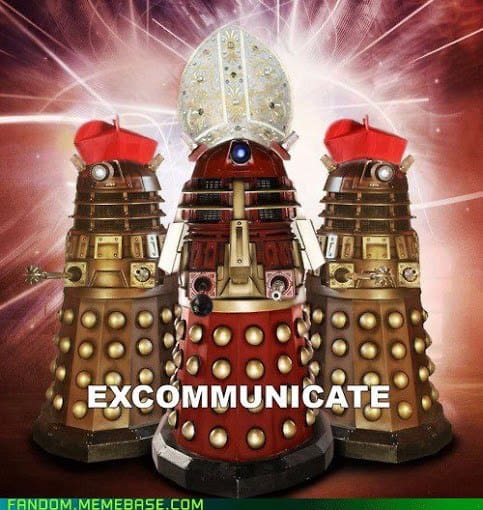
Doctor Who fans understand the meaning of “Bad Wolf,” which takes on symbolic meaning when adorning the walls of UC-Berkeley’s campus.
I love Doctor Who.
No, really, there’s a 74% chance that I’d be on my knees worshipping a Time Lord in Gallifrey’s Panopticon if I had access to a TARDIS and wasn’t studying to be a Catholic priest. Lacking a TARDIS (…and believing in the Nicene Creed), instead I content myself by speculating on the intersection of faith and Doctor Who. So it’s no surprise that I loved watching this video on PBS’ Idea Channel where host Mike Rugnetta asks if Doctor Who is a religion. Check it out:
Watch Is Doctor Who a Religion? on PBS. See more from Idea Channel.
In the interview Rugnetta draws upon Clifford Geertz’s three-part definition of religion as “(1) a system of symbols which acts to (2) establish powerful, pervasive, and long-lasting moods and motivations in men by (3) formulating conceptions of a general order of existence…”. Using this definition Rugnetta shows that the Whovians who compose Doctor Who’s huge fan base are a near-perfect example of an “effervescent” community. We attend conventions, we write fan fiction, we create fan art, we chat about the show. And we do cosplay. Doctor Who as religious community? Check.
But that’s not all. Whovians also share the many cosmos-ordering symbols found in Doctor Who. These are the symbols that make sense of the fictional world of Doctor Who, providing its philosophical framework of right and wrong, the meaning of life and the justification of the Doctor as “capital G good” and the Daleks as evil incarnate. As fans learn to speak and innovate within the language of these symbols, they can give birth to a “religious idea” in the sense coined by the famous French sociologist Émile Durkheim.
Obviously Doctor Who is not wholly unique in all of this, and the question of reading fandom as religion has been asked of many television shows – including Michael Jindra’s examination of Star Trek. In his essay on Star Trek fandom he noted that it “seemed akin to a religious movement” with its own origin myth, a set of beliefs, organizations, schisms among fans and even “a stigma associated with Star Trek fans that is similar to that directed against serious devotees of other religions.”1 Despite being the older of these two shows, Doctor Who still awaits an academic study of its fandom’s religiosity (but this book may come soon). In the meantime, you can catch Splendid Chap’s discussion of Doctor Who and Religion in their July podcast.
Watching Rugnetta’s video and listening to the Splendid Chap podcast may be (okay, are) awesome, but they do stir up some challenging thoughts and feelings. And this because they challenge me as a Christian to discern how I allow these various symbols to replace or complement Christ. When I stop to think about I ask myself:
- Do I allow symbols and values from a fictional television show take the place of Christ’s teachings?
- Or do I do it because it’s what the rest of the Whovians are doing?
- Or do many of the show’s symbols and values complement Christianity (probably because they originate from the Christian world view) and bring me closer to Christ?
All these actually deserve my time and attention. Because it’s not just Doctor Who that can usurp my religion. It could be a favorite sports team, or a musical group, it could be a political party, ideology or a national allegiance that functions as – or even replaces – my identity as a Christian?
When I follow this train of thought far enough one last thing becomes clear: it’s even possible for my religion to replace Christ.
— — // — —
- Michael Jindra, “It’s About Faith in Our Future,” in Religion and Popular Culture in America, ed. Bruce David Forbes and Jeffrey H. Mahan (Berkeley, CA: University of California Press 2000), p. 167 ↩


